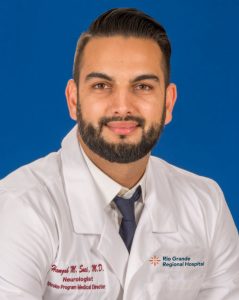|
Only have a minute? Listen instead
Getting your Trinity Audio player ready...
|


Dr. Hamzah M. Saei,
Vascular Neurologist &
Stroke Program Medical Director

Dr. Hector Urrutia,
Cardiologist
May is Stroke Awareness Month, and Rio Grande Regional Hospital (RGRH) wants you to know the best way to protect yourself and your loved ones. Understanding the risks and how to control them can lower the possibility of having a stroke. While we can’t control our age or family history, we can implement preventive measures to safeguard our health.
If you have heart disease, high cholesterol, high blood pressure, or diabetes, you can take steps to lower your risk for stroke. Dr. Hamzah Saei, Board-Certified Vascular Neurologist and Stroke Program Medical Director at RGRH recommends making lifestyle changes such as; stop smoking, implementing a balanced diet, maintaining a healthy weight, staying physically active, limiting alcohol, and ensuring any medical conditions are kept under control. Dr. Hector Urrutia, Board-Certified Cardiologist, recommends healthy adults have a cholesterol test every five years. Individuals with heart disease, diabetes, or a family history of high cholesterol should get tested more often. Extra cholesterol can build up in the arteries, including those of the brain, and lead to a stroke or other problems.
High blood pressure is also a leading cause of stroke. Individuals with high blood pressure may not experience symptoms; therefore, it is important to check one’s blood pressure regularly, either at the doctor’s office, home, or local pharmacy. If you have high blood pressure, the doctor might prescribe medications and recommend lifestyle changes. In addition, if you have diabetes, maintaining your blood sugar under control also helps lower your risk of a stroke.
In case you or a loved one have certain heart conditions such as coronary artery disease or atrial fibrillation (irregular heartbeat), you must talk to your doctor and take care of your heart. Staying on top of your heart health can help prevent having a stroke. To learn more about the stroke & neurosciences services at the hospital, visit RioHealth.com.



